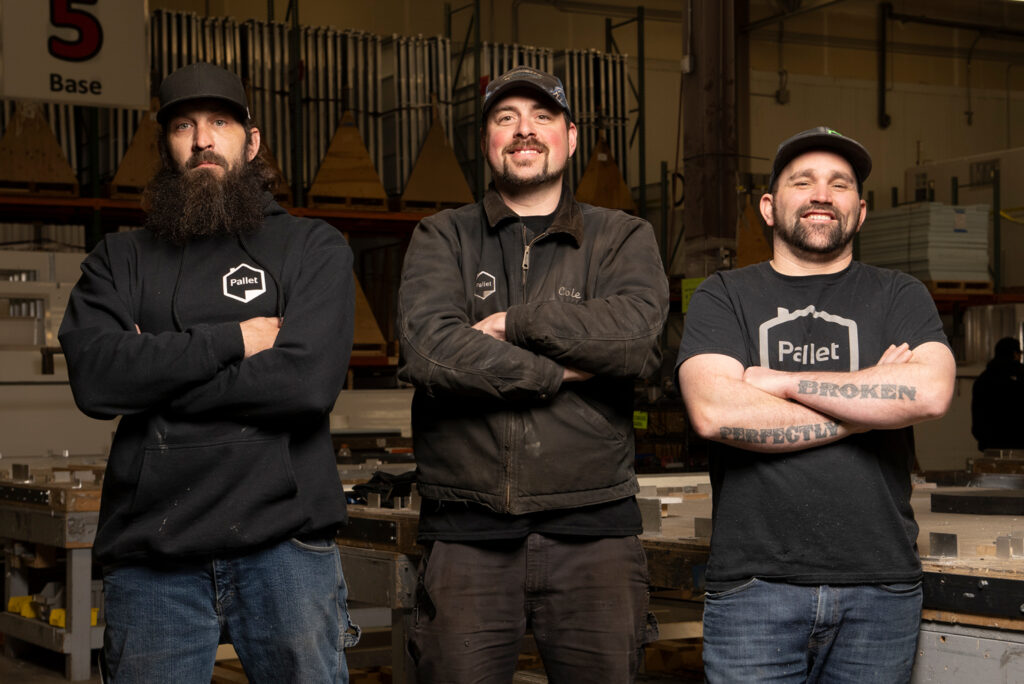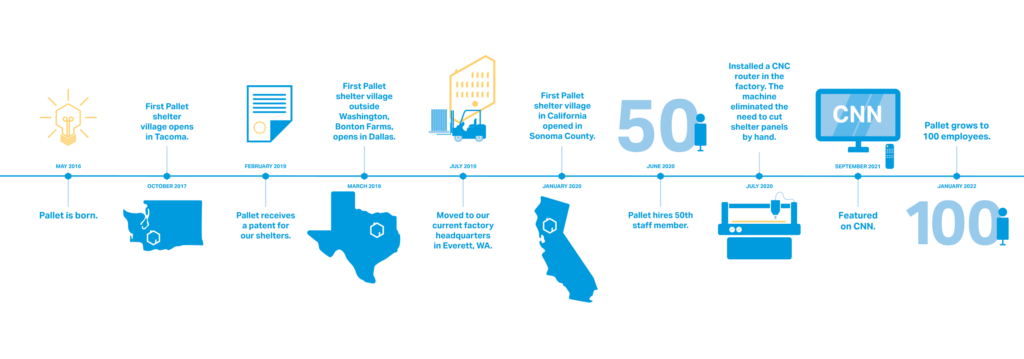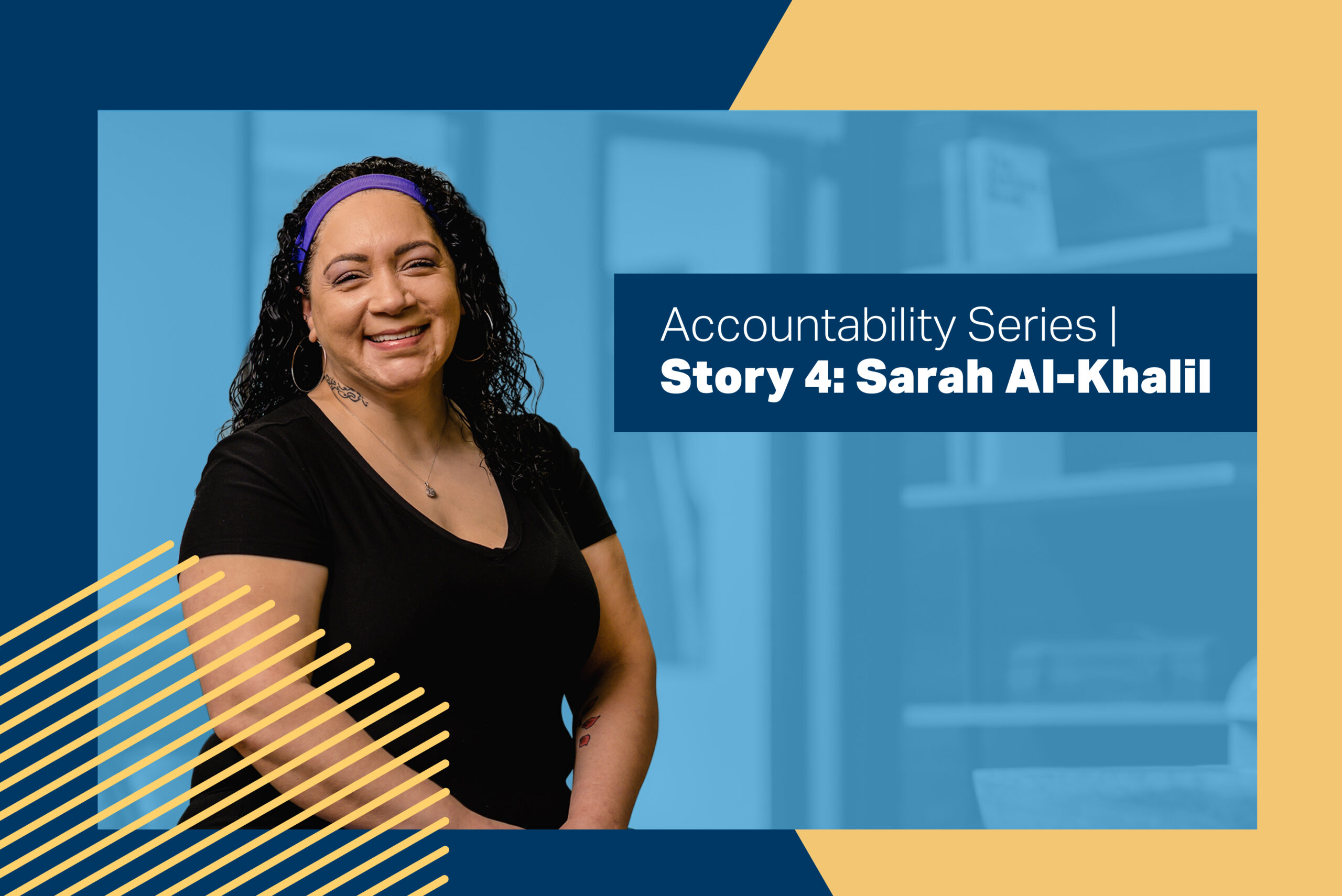The early days of Pallet as told by longtime employees
September 26, 2022

Pallet is the leader in rapid response shelter villages. There are nearly 100 active villages across the country where unhoused people can access dignified shelter with a locking door and on-site social services. With their basic needs taken care of, residents can focus on taking the next step.
Today Pallet is addressing unsheltered homelessness at scale and building a nontraditional workforce. Among the more than 100 employees, three people have been a part of this innovative endeavor since the beginning — Brandon, Cole, and Josh. They were early adopters of our mission and continue to play an integral role as we grow. All three have backgrounds in construction, so Pallet was a natural fit.
Here's a look at Pallet’s growth from their perspective.
Pallet is born May 2016
Pallet began with the idea of sheltering displaced populations, and it took some time to design the physical structure. Our engineering team created several prototypes before finding suitable materials and shelter sizes. Brandon recalls those early days.
"Lots of waves and roadblocks. They did a lot of research to figure out a lot of different things — fire rating to snow loads, wind ratings, square feet," Brandon explained. "I remember so many hurdles to get over because this was not a normal product. This was not a piece of wood."
Building the shelters was lengthy and tedious because the team cut each of the seven panels with a skill saw. By summer 2020, Pallet added a CNC router to the factory, which improved accuracy and efficiency. What initially took months to build can now be done in a fraction of the time. The manufacturing team produces 50 shelters a week.
"The evolution of this product is crazy," Cole shared. "You never would have thought it was going to have an air conditioner, a breaker box, and a heater and all these amenities that most of our houses have nowadays."

In the beginning, we held numerous demonstrations to showcase our shelters. It's where Brandon realized this was what he wanted to be doing — building dignified space for our vulnerable neighbors. At this point, he'd built a strong relationship with Pallet's co-founders, Amy and Brady King. Brandon believed in them and what they set out to accomplish. He ignored those who didn't think our transitional shelters would work.
"I knew it was a good idea. I just wholeheartedly knew it. And I didn't really have a reason why," Brandon shared. "I just knew that it felt good to do this, especially once we started doing deployments, then it really kicked in."
While Pallet worked to find its footing, only a handful of people were working for the company. Over time the number steadily increased, and today there are more than 100 employees. Josh was one of two in the factory building shelters when he started. Now he's surrounded by dozens of others and working on research and development. During company-wide meetings, he marvels at the number of people present.
"Every time we have an all-hands meeting, I get choked up every single time. I'm just blown away with how many people we have here," Josh shared. "The ways that we've grown and moved forward. It's just unbelievable."
Personal growth
As Pallet evolved, so did the team. Josh talks fondly of the relationship he built with Zane, recently retired Director of Engineering, and Greg, now Director of Operations. Josh said the two helped mold him.
"We all came from a construction background, and it was yell, scream, and get your point across. Zane taught us how we didn't have to do that. We could actually talk civil and come up with ideas together," Josh shared. "That's what I strive for in the R&D section. If I have an idea, I'm going to ask four people before I actually do it because what if I'm thinking wrong?"
For Cole, joining Pallet was an opportunity to move away from the grueling work of building permanent homes. He'd been working in construction since he was a teenager and thought he would be stuck in that role until he couldn't walk anymore. He's moved from Manufacturing Specialist to Supervisor to Manufacturing Engineer. Cole's time at Pallet coincides with his recovery journey.
"I focus really hard on a daily basis on growing as a person to better my people skills and my career," Cole added. "Being teachable and being humble and learning something new every day."
In addition to personal development, all three say being able to help those in need is a bonus for working at Pallet. They've each been able to talk with Pallet shelter village residents who are stabilizing and working on moving into their own place.
"It's not just about helping people. It's about changing people," Brandon shared. "When you can be there on-site and watch them move in and see how happy they are. That was probably the greatest reward I've ever had when I came to this company."

